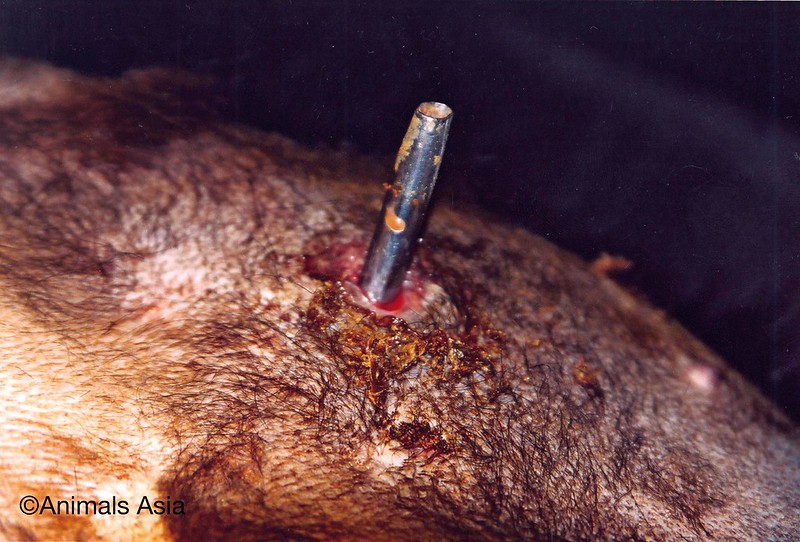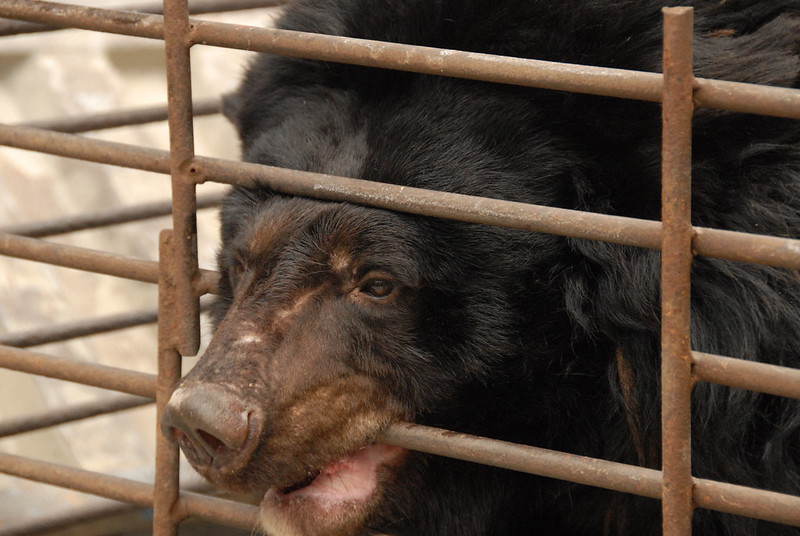#MoonBearDay2019: All about moon bears
26 July 2019
The Asiatic bear is famed as the most playful of all eight bear species, but sadly, it is also the most exploited.
There are eight species of bear, and quite possibly the least well known is the Asiatic black bear, otherwise known as the moon bear.
The species is deserving of its reputation as the most playful bear, with those in sanctuaries consistently exhibiting a relaxed love of playing with items such as logs, swimming in pools, wrestling with friends and even playing on swings.
Animals Asia Founder and CEO, Jill Robinson MBE, who has worked with the species since the early 90s, said:
“Moon bears are incredibly strong and majestic animals but they have the most gentle spirit. They have a slow, languid demeanour and a burning curiosity for everything around them.
“I’ve been fortunate enough to spend over 25 years around these sweet bears and they continue to surprise me every single day. Each bear is an individual. A beautiful soul with their own emotions, loves, habits and temperament and to see them healthy and happy playing in sanctuary is truly food for the soul.”
Moon bears are smaller than their American black bear cousins with adult males weighing around 150kg. They have a distinctive lemon-coloured, v-shaped crescent on their chest from which their name is derived.
While the species is thought to be mostly solitary in the wild, those living in sanctuaries have been observed to form life-long bonds with many choosing to sleep together for extra warmth during the colder months.
Unlike brown bears, moon bears do not hibernate over most of their range. Instead, most go through a period known as winter dormancy during the coldest parts of the year. Most moon bears will become much less active at this time of year, sleeping for the majority of the day and relying on fat reserves built up during the autumn.
However, this behaviour has been observed to be very individualistic and affected by latitude. For example, some bears at Animals Asia’s China Bear Rescue Centre engage in winter dormancy for up to three months, while those in the warmer climes of the charity’s sanctuary in Vietnam are much less likely to do so.
A species in decline
Yet tragically, this iconic species is becoming increasingly rare. Moon bears are the most exploited bear species on the planet, listed as Appendix 1 “most endangered” by CITES and have become effectively extinct in many countries, including Vietnam.
While habitat loss is a major factor in falling populations, by far the greatest cause for the demise of moon bears is their unfortunate standing as the bear of choice for the bear bile industry.
Moon bear bile has the highest levels of ursodeoxycholic acid, making their bile a prized ingredient in traditional medicine.
Despite the wide availability of synthetic and herbal alternatives, around 12,000 moon bears are currently believed to be held in extreme captivity throughout Asia suffering regular bile extraction for the traditional medicine industry.
The extraction of bear bile from live bears causes unimaginable suffering and long-term psychological and physical damage as each bear is held in tiny barren cages.
While some bile farm moon bears have been known to endure this cruelty for up to 30 years, most farmed bears are starved, dehydrated and suffer from multiple diseases and malignant tumours that ultimately kill them within a decade.
Multiple reports by Animals Asia, Traffic and Free the Bears have proven that bear bile farming, once touted as a tool to aid conservation, has had a catastrophic effect on wild populations.
Moon bears desperately need our help. They are the most playful, but also the most exploited bear on Earth and none of their suffering is necessary.
No bear should have to suffer endless bile extraction for traditional medicine or endure a lifetime of cruelty for a moment’s entertainment on a circus stage.
Stand up against cruelty to moon bears, whether for traditional medicine or the entertainment industry. Sign the pledge to join the global movement against cruelty to moon bears and join thousands of #MoonBearHeroes pushing for change.
BACK







